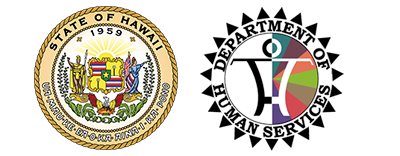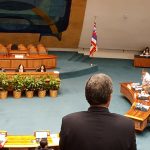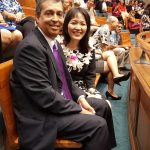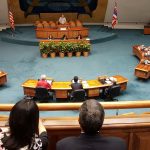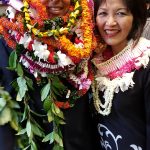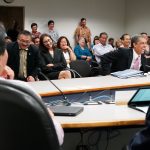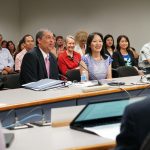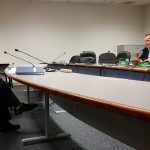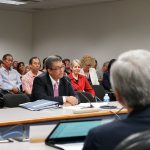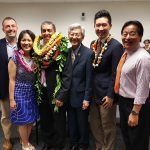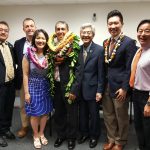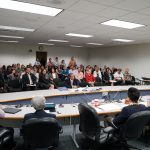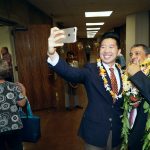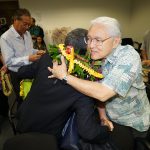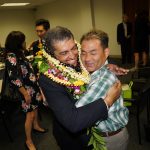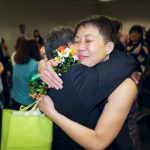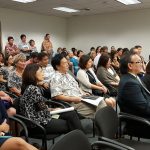Thank you Chair Green, Vice Chair Chang, Chair Tokuda, Senator Wakai, and Senator Harimoto for this opportunity to testify in support of my nomination for the Director of Hawai‘i Department of Human Services (DHS). I am overwhelmed by this outpouring of aloha, love, and support for me. I am very thankful to Governor Ige for nominating me as the Director of Human Services. It is a great honor and privilege to serve our great state and lead the department, working with almost 2,300 plus colleagues on a daily basis to make a difference in the lives of 1 in 4 residents and almost half the children of Hawai‘i.
Chair, my comments today will focus on my background, my career at DHS, and DHS’ short- and long-term vision moving forward.
I was born into a middle-class Indian family to Joginder Lal and Shashi Bhanot. My father was a lawyer and mother a musician with a master’s degree in vocal and instrumental music. I also come from a long line of lawyers on my mother’s side and educators on my father’s side.
Both my parents stressed the importance of education and doing good in life. I was in awe of my father and maternal grandfather’s standing in the community in which they lived and practiced law. I wanted to be a lawyer just like them.
My dream of becoming a lawyer and practicing law faded in an instant after a brief but eventful fourteenth birthday dinner conversation with my maternal grandmother, Shakuntala. During the dinner, grandma suggested that I should pick a career where I could make difference in the lives of those who are struggling in life and having a hard time making ends meet. I was very confused and asked her as to what would she recommend as a career…she smiled and responded … public service and I would also be able to use my legal training to shape public policy and help a lot of disadvantaged people. I promised my grandma that I would pursue law and public service upon completion of my education.
The next phase of my life between 1980-1995 really defined me as a person and professional. It tested my character, integrity, and discipline, and took a lot of love, care, support of my grandma and mom, hard work, and a relentless pursuit of excellence to have a career and success I enjoy today.
After completing 10th grade education in Jalandhar, my home town, we were compelled to move to Delhi in 1980 due to my father’s ill-health and personal issues. He was unable to work. We suddenly were on the verge of becoming homeless but with the help of our extended family we were able to survive. My father’s health began to improve, and he started to work again on a part-time basis but now we were no more than a hand-to-mouth low-income family living with a father and husband who began to abuse alcohol and resorted to domestic violence that arose out of his alcohol abuse, low-self-esteem, frustration, anger, and shock that he was unable to fully recover from his illness and regain his professional stature. This adverse experience of living through poverty and domestic violence, and watching a perfectly good family man succumb to alcohol abuse, made me resolute to dedicate my life to human rights, including advocacy against domestic violence, child abuse, and alleviation of poverty. I also realized very early on that education is the only way out of poverty and a key to success at a personal and professional level.
I went on to graduate from a public high school with distinction, received a BA honors degree in political science, and a law degree with a distinction from the University of Delhi.
In 1990, I was admitted and awarded full graduate fellowship to the Cornell University, School of Law, to pursue LL.M. This decision to leave India was based on a number of factors: 1. pursuit of excellence; 2. gain international experience to further my career in public international law and human rights, and 3. build a career to support my family. I graduated in 1991 with an LL.M. degree and honors in International Human Rights.
I was a visiting researcher at the Boalt Hall School of Law, University of California at Berkeley in 1991; and research associate at the Elliott School of International Affairs at the George Washington University, Washington DC, in 1992/1993. These research projects were related to international human rights law and policy.
From 1993-1997, I pursued post-graduate research in Public International Law at the School of Law, University of Nottingham, England. The focus of my work was on the Rights of Migrant Workers and their Families in International Law. I was awarded the University of Nottingham Law School and European Union fellowship to pursue studies in public international law and the Mildred Towle Fellowship through Hawai’i Community Foundation to study and promote international harmony and inter-racial understanding. I was also invited to be a visiting researcher at the Center for Migration Studies on Staten Island, New York City in 1994/1995. Unfortunately, I was unable to complete my Ph.D. due to family and serious health reasons.
In 1995 and while I was pursuing my studies in England, my father passed away at the age of 60 of brain cancer. A couple of years before his death, my father was able to overcome his anger, gave up alcohol, and reconciled with his family. Now, the responsibility of ensuring my family’s future and overall well-being became my singular focus. I assisted my mother in raising my sister and supporting two brothers until they became self-sufficient.
My professional career in human and social services began in August 1998 when I joined the Kaua‘i Economic Opportunity on the island of Kaua‘i as their Family Development Director. I focused on the programs and services for immigrants, refugees, poor, and low-income families.
In September 1999, I fulfilled my promise to my maternal grandmother that I will pursue law and dedicate my career to human rights and public service. I joined DHS as an emergency hire program specialist with the Employment and Child Care Program Office of the Benefit, Employment and Support Services Division (BESSD). I became a permanent civil servant in July 2000.
In July 2002, I was promoted to the Employment and Child Care Program Administrator position. In 2006, I was awarded the employee of the year by DHS and also recognized by the governor for my public service and contribution to improving the lives of families on public assistance. In April 2007, I became the BESSD Administrator. In 2013, I was awarded the Manager of Year award for DHS and Governor’s State Manager of the Year award for my contribution to improving the government function and the well-being of and making a difference in the lives of Hawai‘i’s disadvantage population. My success was made possible by the hardworking and dedicated colleagues across BESSD. I will forever be thankful for the support of Cheryl Takano, Scott Nakasone, and Julie Morita.
I served as the Deputy Director of the department from December 2010-January 2012; and January 2015-August 2016. In September 2016, Governor Ige appointed me as the Director of Hawai’i Department of Human Services.
The Department of Human Services is responsible for programs, benefits, and services for the poor, low-income, and disabled populations, including financial assistance, food, employment programs, utility payments, child care, regulation of child care facilities, medical assistance, vocational rehabilitation programs, child welfare services, adult protective and community services, services for the homeless, public housing, services for at-risk youth, promoting equality for women and girls, and promoting the role of fathers in their children’s lives. We have 2,300-plus employees statewide and a budget of $3.4 billion. Over the last 17 years, I have the pleasure and privilege of working with very talented and committed colleagues across our department. The commitment of our employees to make a difference cannot be questioned. Our employees are the most important asset or resource we have.
Vision: Our Vision is to ensure that the people of Hawai‘i are thriving.
Mission: Our Mission is to encourage self-sufficiency and support the well-being of individuals, families, and communities in Hawai‘i.
Core Values: We are driven by 6 core values. We are
| T | Team-oriented – We acknowledge that internal and external partnerships are critical to the success of DHS. |
| H | Human-centered – We develop strategies and make improvements as necessary from the client’s perspective. |
| R | Respectful – We recognize the inherent value of each person as well as the diverse cultures of Hawaii. |
| I | Intentional – We are mindful of our decisions and actions in our collective work. |
| V | Visionary – We strive to support our clients by co-creating generative, forward-looking strategies. |
| E | Evidence-based – We make decisions that are based on data and take actions that we know will have sustainable outcomes |
Strategic Goals: Our strategic goals address the various social determinants of health and well-being, which include employment, education, healthcare, safety, housing, and food security – all of which contribute to an individual’s self-sufficiency, social capital, and well-being.
I want to emphasize to everyone that prevention of child abuse and neglect, adult abuse, neglect, and exploitation, domestic violence, and sex and human trafficking, is our priority and such violations of human rights are not acceptable.
We will continue to invest in children between 0 to 5, invest in the health and well-being of our communities, and create a culture of health in Hawai‘i, promote equal rights for women and girls – particularly paid family leave – promote the role of fathers in raising their children, address homelessness, and increase housing stability.
Our goals and commitment to improve the well-being of Hawai‘i’s children, families, and communities are the same as articulated by our Governor, Senate, and House leadership.
Our work is guided by the Aloha Spirit, section 5-7.5, Hawaii Revised Statutes:
Aloha is more than a word of greeting or farewell or a salutation. Aloha means mutual regard and affection and extends warmth in caring with no obligation in return. Aloha is the essence of relationships in which each person is important to every other person for collective existence.
Furthermore, Article IX, Section 3 of our State Constitution provides that the State shall have the power to provide financial assistance, medical assistance, and social services for persons who are found to be in need of and are eligible for such assistance and services as provided by law.
Over the last couple of years, the field of human services is living through an era of disruption. In our human services environment, major changes in demographics, policy, and technology are driving a surge of new service demands and upending outdated human services delivery models. While disruption is bringing formidable challenges for human services organizations, it is also creating an unprecedented opportunity to deliver improved individual, family, and community outcomes.
When disruption is the new normal, we must think very differently and position ourselves to be in the most ideal position to serve ever-changing and dynamic clientele. Business as usual, or admiring the status quo, is not acceptable. We must be very strategic, innovative, creative, and intentional in all our efforts if we want to make a difference in the lives of residents who knock on our doors on a daily basis seeking assistance to get themselves out of the cycle of intergenerational poverty and despair.
We began 2016 with the introduction of ‘Ohana Nui, a multigenerational framework that invests early and concurrently in children and families. The ‘Ohana Nui framework was developed by my good friend and our former Director Rachael S. Wong in collaboration with the Aspen Institute and Dr. Ginny Pressler and her team at the Department of Health. Thank you Rachael and Ginny for your vision and leadership. Presently, we continue to work diligently to embed ‘Ohana Nui deep into the department’s policies and operations to help Hawai‘i residents achieve health, education, employment, and other outcomes. This approach allows us to more efficiently align programs and funding to make a greater impact on the whole person and the whole family.
In support of this new framework, we look forward to emphasizing three other department priorities during the current fiscal year and the next biennium: craft a first comprehensive strategic plan for DHS, reengineer DHS business processes, and develop the DHS Enterprise System. These priorities support the development of ‘Ohana Nui by enabling us to serve residents across programs and divisions with an integrated eligibility and case management application and a vision for the future that connects residents quickly to all the resources we offer.
We can’t accomplish these goals and objectives without the support and collaboration of my DHS colleagues, executive branch partners, community partners, and our Legislature.
I urge my colleagues across DHS to support our ‘Ohana Nui effort, participate in the strategic planning, business process reengineering, and DHS enterprise system efforts. It is our opportunity to create a health and human service ecosystem that is responsive to the needs of our families, children, and communities and allows us to meet families where they are. We also must remember that we are the trustees of public funds and the public’s trust. We must find ways to leverage resources and work efficiently and collaboratively to make a difference.
I urge my colleagues across the executive branch to bust the silos and work collaboratively to integrate funding, service delivery, and achieve positive outcomes for families. Let’s make a difference through our collective will and work.
I urge my non-profit community partners to collaborate with us to redesign the health and human service delivery system by focusing on our strengths to address the social determinants of well-being across our communities. Government resources are getting scarce and it may not be possible to fund many programs and services at the level we were able to fund in the past. We must streamline and find new and efficient ways to deliver services, and I request you to support and use the ‘Ohana Nui framework to redesign and deliver services to make a difference.
I invite our non-traditional partners, such as for-profit businesses, philanthropy, and banks, to join our efforts to streamline the health and human services delivery models. You all have the resources to fill the gaps government is unable to address. We also want to learn from your creativity, innovation, and success in business and apply the same principles to make government more efficient and responsive to the needs of our community. Let’s partner to make a difference.
Lastly, I urge our Legislature to work with us collaboratively to craft a budget that is affordable and enact effective policies to make a difference in the lives of residents of Hawai‘i. We know our economy is not growing at the rate we expected and all our requests can’t be funded. We are standing by to work with you to make a difference.
Being appointed as the Director of Human Services is the culmination of a 14-year old boy’s dream and promise to his grandmother to pursue law and career in public service to make a difference in the lives of disadvantaged and poor.
Nothing would have been possible without the love, support, care, and encouragement provided by my family and friends; listening to and learning from elders; pursuit of education and excellence; self-belief; commitment to making a difference; courage to challenge the status quo and bring about change; and not ever quitting.
I would like to acknowledge the presence of my lovely wife and best friend Lynn Reiko Bhanot, many friends and colleagues in this room and those who submitted testimony online, particularly our Deputy Director Bridget Holthus and my secretary Katherine Korenaga. Our son Satya is unable to attend as he is attending college in California. My personal and professional success is made possible due to Lynn and Satya’s unconditional love and support. To my late grandmother thank you for your love, wisdom, and guidance. To my mom in India, thank you for bringing me to this world and loving me unconditionally.
Thank you for the opportunity to testify and considering me for the Director of Hawai‘i Department of Human Services.
